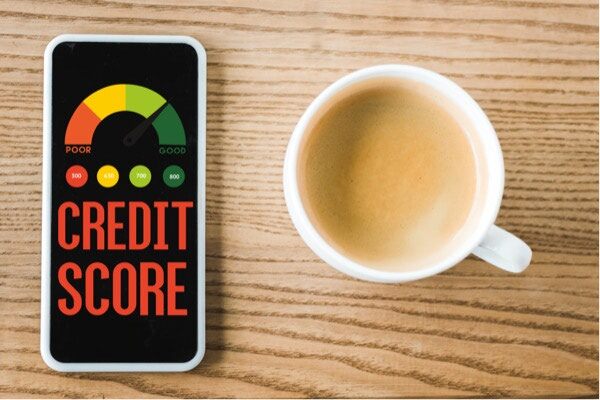How does one improve their credit score? Here are four key tips to help you build your credit profile this year.

How do loans impact mortgage qualification?
You’re hoping to enter the market as a home buyer, but you still have existing loans from other debts. Do those existing loans impact mortgage applications? It’s not the loans themselves that impact your mortgage, but how you’re handling them. In this post, we’ll discuss a few factors that determine whether or not you have a good grasp on your loans, and we will cover additional ways to improve your chances of securing a mortgage. Your loans don’t need to stop you from buying a home!
Your credit score
Loans will affect your credit score, which means loans impact mortgage qualification. Your credit score is made from factors like your credit usage and payment history, which we will review in further detail below. Right now, we’re going to focus on your score itself. If it falls under 650, this indicates your credit is not in the best shape, and you might face some challenges getting mortgage financing. You will likely need to work on increasing your score before applying for a mortgage to increase the odds of securing the best product. Could your loans be behind your credit score? Certainly! If you have a good handle on your loans, your credit score is likely to be higher. If you’re struggling to pay off those loans, this will negatively affect your credit score. You can read more about the creation of your credit score and how to improve it here.
Your payment habits
As we touched on above, your payment history will have a huge impact on your credit score and therefore your mortgage. When it comes to your loans, payment habits make a big difference between a creditworthy and non-creditworthy borrower. If you consistently make your payments on time, and pay the required amounts, you will gain a better reputation as a borrower. On the other hand, missed or late payments won’t leave quite as good of an impression. The way you handle your loan payments will affect your mortgage qualification because lenders will use this as a hint of how you might deal with mortgage payments. Lenders are not likely to finance a mortgage if they think you won’t be able to make your payments, an impression they may get if you have trouble making your loan repayments.
Your debt-to-income ratio
Finally, the actual amount of debt you hold in loans isn’t as important as the ratio it creates with your income. This means someone with a big loan may be able to secure a mortgage if they have a high income to support it. Likewise, even if a borrower has a small amount of debt, if their income is low enough that the debt makes up a big chunk of their payments, they may struggle with mortgage financing. In general, your debt-to-income ratio should be below the 35 per cent mark, but there is variation depending on the lender. This means your debt payments do not take up more than 35 per cent of your income, so lenders will still have confidence you can handle mortgage payments as well.
How else can you help get a mortgage approval?
Is there anything else you can do to better your chances of securing a mortgage? Apart from dealing with your existing loans, you should definitely take other factors into account, and think about your next steps. Here are a few examples of things you should (or shouldn’t) do during this process.
Don’t take on more loans
You already have some loans to deal with. Now that you understand how loans impact mortgage qualifications, do your best to not take on more loans and add onto your payments. This will increase your debt-to-income ratio, increase the chances of missed or late payments, and make lenders more doubtful about your creditworthiness. If you are able to hold off on new car loans, lines of credit, or credit cards, for example, wait until a later date to take on those new debts. Lenders need to be sure there’s room for mortgage payments in your budget, and they will see new loans as taking up space meant for monthly mortgage payments.
Try a budgeting app
It can be hard to keep track of your money, so why not let a budgeting app help you out? Between your income, debts, and other expenses, maintaining a budget can be difficult, especially if you’re trying to work out how a mortgage can fit in. Budgeting apps help you visualize how you spend your money, and assist you in organizing your future savings and expenses. In this blog, we talk about revamping your budget, and we touch on two of the most popular apps, Goodbudget and Mint. There are endless budgeting apps out there, and they have different layouts and methods, but all have the same goal of helping you track your spending and increase your savings.
Get pre-approved first
Finally, be sure to get that pre-approval! Your pre-approval tells lenders all about your financial situation, giving them an idea of the mortgage amount they may approve you for. It also tells you where you stand in terms of budgeting and how much home you can afford. Keep in mind your pre-approval doesn’t guarantee financing, so don’t take your foot off the gas once you get it! Keep up with your current habits if your pre-approval is good, so you can have the best chance of securing that final mortgage approval.
There’s several ways loans impact mortgage applications, but loans don’t have to stop you from buying a home. If you can handle your current debts, and prove you have the finances and ability to take on a mortgage, you will be in good shape. We also recommend contacting a mortgage broker before you get going on your home buying experience! We can help you sort out a potential budget and repayment plan for your loans, and we will guide you to the lenders who can give you the best mortgage product.
If you have any questions about your mortgage, get in touch with us at Clinton Wilkins Mortgage Team! You can call us at (902) 482-2770 or contact us here.


